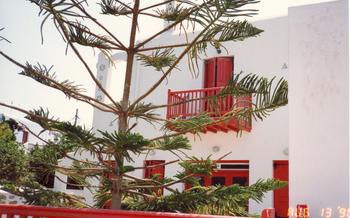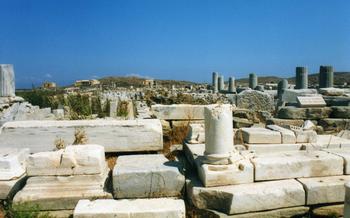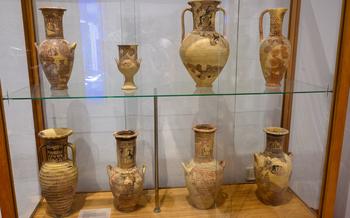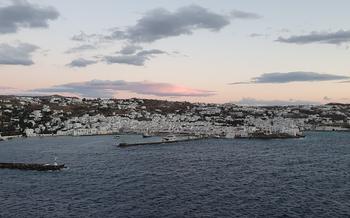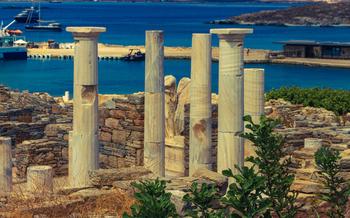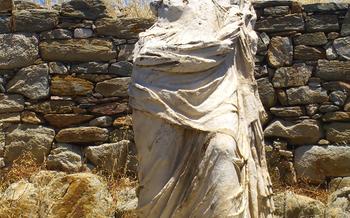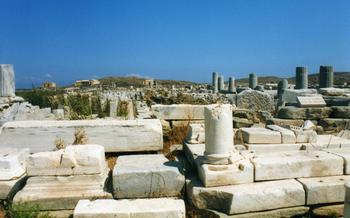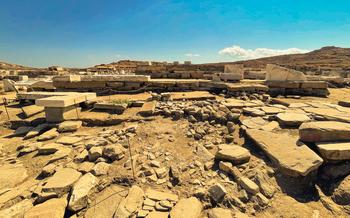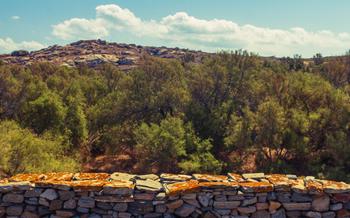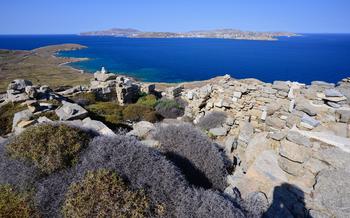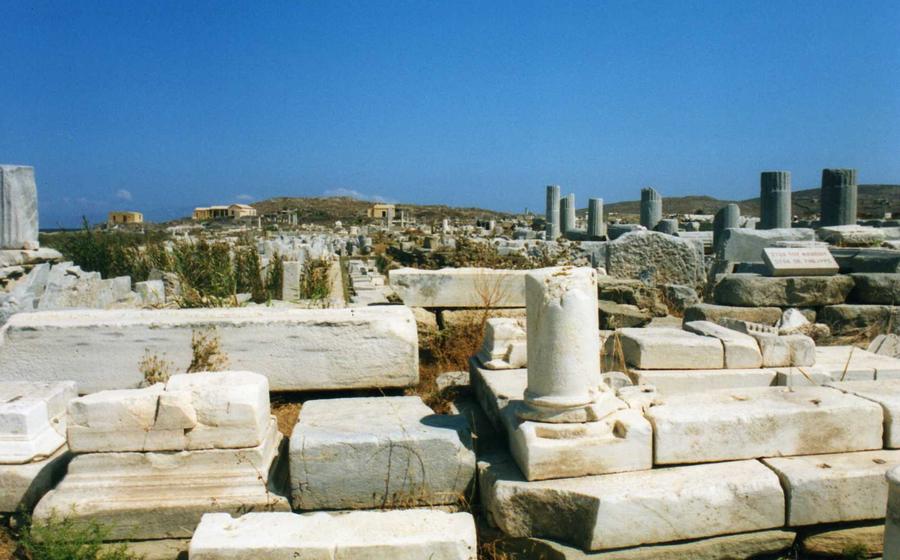
Delos Synagogue
- A Cycladic Wonder: Unveiling Mykonos' Delos Synagogue
- A Journey Through Time: Exploring the Ancient City of Delos
- Architectural Marvels: Delos' Enduring Legacy
- Natural Beauty: Delos' Untouched Landscapes
- A Day Trip from Mykonos: Planning Your Visit
- Unforgettable Experiences: Delos Beyond History
- Photography Haven: Capturing the Essence of Delos
- Local Delights: Savoring the Flavors of Delos
- Sustainable Tourism: Preserving Delos for Future Generations
- Historical Context: Understanding Delos' Significance
- Solo Traveler's Paradise: Delos for the Independent Explorer
- Insider Tip: Unveiling Delos’ Hidden Gems
A Cycladic Wonder: Unveiling Mykonos' Delos Synagogue
In the heart of the Aegean Sea, amidst the picturesque islands of Greece, lies the ancient island of Delos, a place steeped in myth, history, and cultural significance. Among its many treasures, the Delos Synagogue stands as a testament to the rich Jewish heritage that once flourished on this sacred land.
Built in the 1st century BC, the Delos Synagogue is one of the oldest and best-preserved synagogues in the world. Remarkably intact, it boasts intricate mosaic floors depicting menorahs, shofars, and other Jewish symbols, offering a glimpse into the vibrant Jewish community that thrived on Delos.
The synagogue's unique architectural features, such as its east-facing orientation and the presence of a mikveh (ritual bath), showcase the deep connection between the Jewish community and their religious traditions. Its existence serves as a powerful reminder of the diverse cultures and influences that shaped ancient Greece.
Visiting the Delos Synagogue is an opportunity to delve into the fascinating history of Jewish life in Greece. The synagogue stands as a testament to the enduring legacy of this ancient community, inviting visitors to explore the rich tapestry of religious and cultural heritage that Delos holds.
A Journey Through Time: Exploring the Ancient City of Delos
Delos, an island steeped in myth and history, stands as one of the most captivating archaeological sites in Greece. Renowned for its sacred significance in ancient times, Delos served as a major religious and commercial center, attracting pilgrims and traders from across the Mediterranean.
Step into the ruins of Delos and embark on a journey through time. Explore the remnants of ancient temples, theaters, and public buildings, each whispering tales of the island's glorious past. Marvel at the Terrace of the Lions, where majestic stone lions once guarded the sacred precinct of Apollo. Stroll along the sacred way, lined with statues and altars dedicated to various deities.
Unravel the fascinating history of Delos, from its mythological origins to its decline and abandonment. Discover the island's connection to the birth of Apollo and Artemis, twin deities of Greek mythology. Learn about the Panhellenic festivals held in Delos, attracting worshippers from all corners of the ancient world. Witness the rise and fall of empires, as Delos transitioned from a thriving metropolis to a desolate island.
Delos offers a glimpse into the daily life of the ancient Delians. Explore the well-preserved remains of houses, shops, and workshops, providing insights into their customs, traditions, and economic activities. Admire the intricate mosaics and frescoes that adorn the walls, depicting scenes from mythology and everyday life.
As you wander through the ruins of Delos, let your imagination soar. Picture the bustling streets filled with merchants, pilgrims, and sailors. Hear the echoes of prayers and rituals performed in the sacred temples. Feel the energy of a city that once stood at the crossroads of the ancient world.
Delos is not merely a collection of ruins; it is a living testament to the power of history, mythology, and human endeavor. A visit to this sacred island is a journey through time, a chance to connect with the past and gain a deeper appreciation for the rich cultural heritage of Greece.
Architectural Marvels: Delos' Enduring Legacy
Delos' ancient city boasts a remarkable collection of well-preserved architectural marvels that showcase various styles and influences. The ruins of temples, houses, and public buildings provide a glimpse into the daily life of the ancient Delians.
-
The Temple of Apollo, with its iconic Doric columns, is a testament to the island's religious significance.
-
The Terrace of the Lions, featuring a row of majestic marble lions, once guarded the sacred precinct of Apollo.
-
The Propylaea, an impressive gateway, served as the grand entrance to the sanctuary.
-
The Theater of Delos, with its well-preserved seating rows, hosted theatrical performances and religious ceremonies.
-
The House of Dionysus, adorned with intricate mosaics, offers a glimpse into the luxurious lifestyle of wealthy Delians.
These architectural wonders showcase the ingenuity and craftsmanship of the ancient Greeks. Delos' enduring legacy lies in its ability to transport visitors back in time and provide a tangible connection to the island's rich history and culture.
Natural Beauty: Delos' Untouched Landscapes
Beyond its rich history and cultural significance, Delos boasts a breathtaking natural beauty that complements its ancient ruins. Pristine beaches, crystal-clear waters, and rugged cliffs create a stunning backdrop for exploring this ancient island. Visitors can immerse themselves in the tranquility of Delos' secluded coves, swim in the clear blue waters of the Aegean Sea, or simply relax on the sandy beaches, soaking up the sun and enjoying the tranquility of this unique destination.
The island's diverse flora and fauna further enhance its natural charm. Rare and protected species thrive on Delos, including the endangered Eleonora's falcon, which nests on the island's cliffs. Visitors can also spot various wildflowers, herbs, and shrubs that add a splash of color to the landscape. The island's diverse ecosystem is a testament to its unspoiled natural beauty and the importance of preserving this unique environment.
Exploring Delos' natural wonders is a perfect way to balance the historical and cultural immersion with a refreshing outdoor experience. Visitors can take advantage of the island's hiking trails to discover hidden beaches, explore the rugged coastline, and enjoy panoramic views of the surrounding islands. Whether you prefer sunbathing, swimming, wildlife watching, or simply taking in the beauty of the natural surroundings, Delos offers a sanctuary for nature lovers and outdoor enthusiasts.
A Day Trip from Mykonos: Planning Your Visit
Delos, the ancient island of myth and history, lies just a short ferry ride away from the vibrant shores of Mykonos. This proximity makes it an ideal destination for a day trip, allowing visitors to step back in time and explore the ruins of a once-thriving city.
Ferry Schedules and Prices:
Ferries to Delos depart from Mykonos Town several times a day, with the journey taking approximately 30 minutes. Prices for a round-trip ticket start at around 20 euros, and advance booking is recommended during the peak tourist season.
Suggested Itineraries:
To make the most of your day trip, consider the following itinerary:
-
Morning: Arrive on Delos and begin your exploration of the ancient city. Visit the Terrace of the Lions, the House of Dionysus, and the Sanctuary of Apollo.
-
Midday: Break for lunch at one of the tavernas on the island, enjoying traditional Greek cuisine with a view of the Aegean Sea.
-
Afternoon: Visit the Delos Museum to learn more about the island's history and culture. See artifacts such as the Naxian Sphinx and the statue of Apollo.
-
Late Afternoon: Relax on one of Delos' pristine beaches, taking a refreshing dip in the crystal-clear waters.
Packing Essentials:
When packing for your day trip, be sure to bring comfortable shoes for walking on uneven terrain, a hat and sunscreen for protection from the sun, and plenty of water to stay hydrated.
By following these tips, you can plan a successful and memorable day trip to Delos, immersing yourself in the history and beauty of this ancient Greek island.
Unforgettable Experiences: Delos Beyond History
Delos offers a multitude of unforgettable experiences that transcend its historical significance. As the sun begins to set, the island transforms into a magical canvas painted with vibrant hues of gold and crimson. Witnessing the sunset from Delos is an experience that will leave you breathless. The sky ignites with an array of colors, casting a warm glow upon the ancient ruins and the shimmering Aegean Sea. It's a moment of tranquility and awe, where time seems to stand still.
Guided tours and educational programs bring the island's history and culture to life. Knowledgeable guides share captivating stories and insights, allowing you to delve deeper into Delos' rich past. These programs provide a unique opportunity to connect with the island on a personal level and gain a profound understanding of its significance.
Throughout the year, Delos hosts special events and festivals that showcase traditional Greek music, dance, and cuisine. These events are a fantastic way to immerse yourself in the vibrant culture of Greece. Experience the infectious rhythms of traditional Greek music, marvel at the graceful movements of Greek dancers, and savor the delectable flavors of local cuisine. These festivals offer a glimpse into the heart and soul of Greek culture, creating memories that will last a lifetime.
Photography Haven: Capturing the Essence of Delos
Delos is a photographer's paradise, offering endless opportunities to capture the island's stunning beauty and rich history through the lens of a camera. The well-preserved ruins, dramatic landscapes, and picturesque views provide a feast for the eyes, inviting photographers of all skill levels to unleash their creativity.
For those seeking the perfect shot, Delos offers a variety of vantage points that showcase the island's unique features. The ancient theater, perched on a hilltop, provides a panoramic view of the ruins and the sparkling Aegean Sea beyond. The Terrace of the Lions, with its majestic row of marble lions, offers a dramatic foreground for capturing the grandeur of the ancient city.
The best time to photograph Delos is during the golden hours of sunrise and sunset, when the soft light casts a warm glow on the ruins and enhances the island's natural beauty. During these magical moments, photographers can capture stunning images of the ancient city bathed in soft hues of pink, orange, and purple.
It is important to remember that Delos is an archaeological site, and photographers must respect the ruins and avoid disturbing them in any way. Using a tripod is highly recommended to ensure stability and capture sharp images, especially in low-light conditions.
By capturing the essence of Delos through photography, travelers can share the beauty and significance of this ancient island with others, inspiring a deeper appreciation for its rich history and cultural heritage.
Local Delights: Savoring the Flavors of Delos
A visit to Delos is not complete without savoring the delicious cuisine that the island has to offer. While the island is primarily an archaeological site, there are a number of tavernas and cafes that serve traditional Greek dishes and refreshing drinks. Visitors can enjoy fresh seafood, grilled meats, and homemade sweets, all prepared with local ingredients and bursting with flavor.
For a truly authentic experience, try the local specialty of "mizithra," a soft, creamy cheese made from sheep's or goat's milk. It can be enjoyed on its own, or used as an ingredient in various dishes. Another must-try dish is "loukoumades," a type of Greek doughnut that is served with honey and cinnamon.
When choosing a place to eat on Delos, look for tavernas that are family-run and use fresh, local ingredients. This will ensure that you get the best possible dining experience. Be sure to ask for recommendations from your tour guide or hotel staff, as they will be familiar with the best places to eat on the island.
Eating on Delos is not only a culinary experience, but also a way to support the local community. By choosing to dine at local establishments, you are helping to preserve the unique heritage of Delos and ensure that it remains a vibrant and welcoming destination for years to come.
Sustainable Tourism: Preserving Delos for Future Generations
As you explore the wonders of Delos, it's essential to remember that this ancient site is a delicate ecosystem that requires our utmost care and respect. Sustainable tourism practices are crucial to preserving Delos' cultural and natural treasures for future generations. Here are some tips for minimizing your ecological footprint:
-
Tread Lightly: Be mindful of your steps and avoid walking on or damaging the ancient ruins and pathways. Stick to designated trails to prevent erosion and protect the site's integrity.
-
Reduce Waste: Carry a reusable water bottle and avoid single-use plastics. Dispose of waste responsibly in designated bins, and consider bringing your own snacks to minimize packaging waste.
-
Conserve Water: Water is a precious resource on Delos, so be mindful of your water usage. Take shorter showers, and avoid leaving taps running unnecessarily.
-
Respect Wildlife: Delos is home to various wildlife, including lizards, birds, and insects. Observe them from a distance and avoid disturbing their natural habitats.
-
Support Local Businesses: Choose to dine at local tavernas and cafes that use fresh, locally sourced ingredients. This supports the local economy and reduces the environmental impact of importing goods.
-
Spread Awareness: Share your experiences of sustainable tourism on Delos with friends, family, and fellow travelers. Encourage others to adopt responsible practices and raise awareness about the importance of preserving this unique destination.
By embracing sustainable tourism, we can ensure that Delos remains a vibrant and awe-inspiring place for generations to come.
Historical Context: Understanding Delos' Significance
Delos' strategic location in the heart of the Aegean Sea made it a natural hub for trade and commerce in the ancient world. Its reputation as a sacred sanctuary attracted pilgrims and visitors from across the Mediterranean, contributing to its growth and prosperity. The island's thriving economy supported the development of impressive architecture, art, and religious practices that left a lasting impact on Greek culture.
In the 6th century BC, Delos became a member of the Delian League, a powerful alliance of Greek city-states led by Athens. Under Athenian rule, the island's importance as a religious and commercial center reached its peak. The construction of the magnificent Temple of Apollo, the establishment of the Delian Games, and the growth of the city's marketplace transformed Delos into a vibrant and cosmopolitan center.
However, Delos' fortunes declined in the 2nd century BC when the Romans took control of the island. The rise of other commercial centers, such as Rhodes and Ephesus, diminished Delos' significance as a trading hub. The island was eventually abandoned in the Middle Ages, leaving behind a rich legacy of ruins and artifacts that continue to fascinate and inspire visitors to this day.
Ongoing archaeological research and excavations on Delos have unearthed a wealth of information about the island's past. These discoveries have shed light on the religious rituals, economic activities, and daily life of the ancient Delians. The island's well-preserved remains offer a unique glimpse into the grandeur and complexity of ancient Greek civilization.
Solo Traveler's Paradise: Delos for the Independent Explorer
With its intimate size and well-marked trails, Delos is an ideal destination for solo travelers who prefer to explore at their own pace. The island's compact layout allows for easy navigation, and there are no large crowds to contend with, ensuring a peaceful and immersive experience.
Tips for Solo Travelers:
-
Plan Your Itinerary: Create a personalized itinerary based on your interests, whether it's history, architecture, or simply soaking up the Mediterranean sun.
-
Explore Independently: Follow the well-marked trails and signs to discover the island's ruins, beaches, and viewpoints at your own leisure.
-
Join a Guided Tour: Consider joining a guided tour to gain insights into the island's history and culture from knowledgeable experts.
-
Meet Fellow Travelers: Strike up conversations with other solo travelers at the museum, cafes, or on the ferry to share experiences and make new friends.
Insider Tip: Unveiling Delos’ Hidden Gems
Beyond the well-trodden paths of Delos, a world of hidden treasures awaits the curious explorer. Venture off the beaten track to discover lesser-known areas that offer unique perspectives and insights into the island's rich history.
Seek out the secluded ruins of the Temple of Artemis, nestled amidst a grove of ancient olive trees. Marvel at the intricate carvings and well-preserved columns that tell tales of a time when the goddess was revered on Delos.
Uncover secluded beaches, tucked away in sheltered coves, where you can bask in the warm embrace of the Aegean sun and immerse yourself in the tranquility of Delos' natural beauty.
Ascend to the highest point of the island, where panoramic vistas unfold before your eyes. From this vantage point, you'll witness the grandeur of Delos in all its glory, with the ancient ruins, sparkling sea, and neighboring islands forming a breathtaking tapestry.
Remember, while exploring these hidden gems, respect the archaeological site and avoid disturbing sensitive areas. Tread carefully and leave no trace, allowing future generations to uncover the same wonders that captivated you.
The reward for seeking out Delos' hidden treasures is an unforgettable experience that will deepen your understanding of this ancient land and create memories that will last a lifetime.
